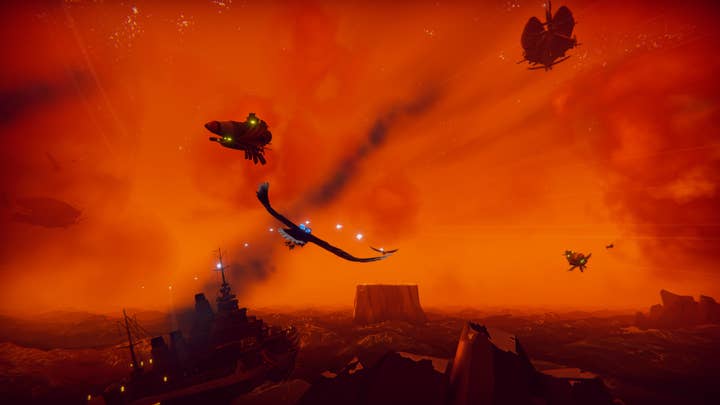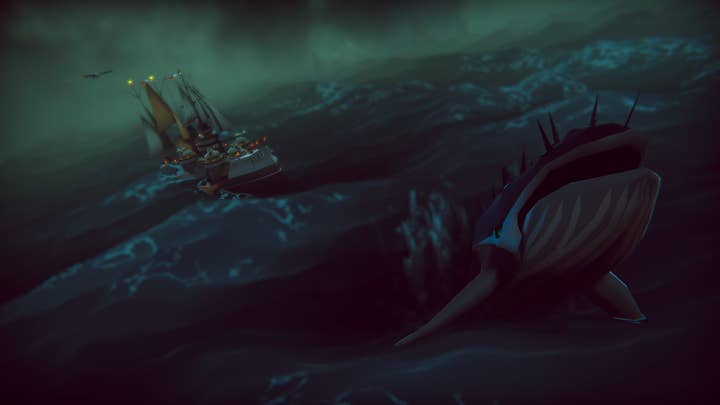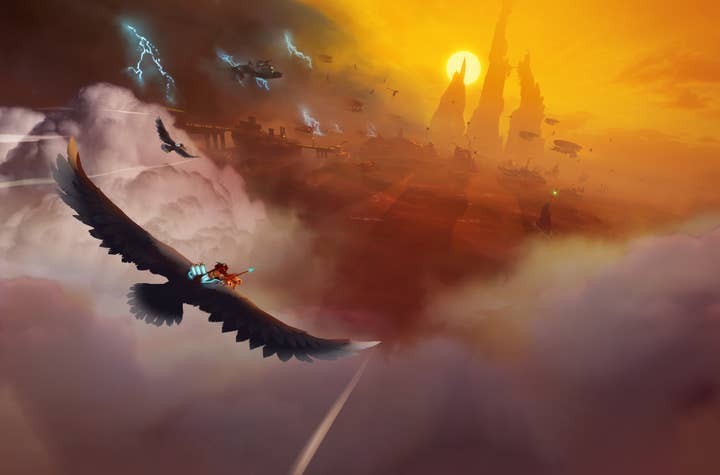The Falconeer: An unexpected jewel in the Xbox launch line-up
Tomas Sala on emerging from a period of darkness and struggle to create an aspirational indie game of rare ambition
With two console launches just this week, there will currently be hundreds of thousands of people searching for something new to play. On PlayStation 5, that could be Spider-Man: Miles Morales, Sackboy, Astro's Playroom, or a particularly fine looking remake of Demon's Souls. On Xbox Series X|S... well, in terms of first-party games at least, the pickings are a little slim.
With COVID-19 disrupting production and depleting the Series X|S launch day line-up, Xbox loyalists will be looking toward third-party exclusives for new games that can't also be found on PS5. It is a relatively small group, to be sure, but the developers within it have the kind of captive and highly engaged audience that can only be found on a brand new platform -- and without the likes of Halo Infinite and Cyberpunk 2077 competing for eyeballs.
"That has been its own rollercoaster ride," says Tomas Sala, the developer behind the Xbox launch exclusive The Falconeer. "Being part of something new, being in the limelight -- it's incomprehensible... Initially, you'd just hope that it finds an audience. That's all you want; to find the group of people that enjoy the specific combination of ingredients you cooked with.
"Being part of something new, being in the limelight -- it's incomprehensible"
"And now it's for all to see, because it's a really strange generational launch, with COVID and the delays to the big titles -- these are very, very strange days."
When Sala is described as "the developer behind The Falconeer," that is more literal than you might think. Although Wired Productions has been onboard as publisher since early 2019, Sala built The Falconeer from a rough prototype into a striking fusion of aerial combat, open-world exploration, multi-layered narrative, and dystopian fantasy entirely alone.
The fact that The Falconeer now sits alongside Assassin's Creed: Valhalla and doesn't wither by comparison is testament to Sala's skill and endeavour -- but it is also a deeply personal validation. The Dutch developer ran a work-for-hire studio in Amsterdam, Little Chicken Game Company, for 18 years, and first explored making a game of his own in a period of professional and emotional stress.
"I started making [my first game] during a burnout -- fairly severe -- and a relationship that broke up," he says. "At some point [later], I had a new relationship and life was looking up a bit. My partner Camille is a ceramics artist, and so she looks at what you make really differently than I did at that time. She looked at a character I was making -- which was a fox with a cape that looked like a hand crushing it -- and she said, 'Oh, that's you right?'

"I said, 'no, no, no, that's not how we do things in games. It's just a cool character... It has no meaning other than the gameplay.' She looked at me, like, 'yeah.' That was a pivotal moment, because I realised that I had been expressing myself in the stuff I was creating, and that I had been so uptight and locked into my very limited way of looking at games that I had no idea I was doing that."
That game was Oberon's Court, Sala's first attempt at making a commercial game following his widely praised Skyrim mod, Moonpath to Elsweyr. However, despite starting it at "the tail-end of the first indie boom" in 2013 and pouring years of work into its development, that moment of insight from Sala's partner made further progress impossible.
"If you're not aware of it, you can't analyse it, you can't build on it, you can't criticise it"
"I couldn't finish it, because it was too dark, it was too confronting," he says. "I think lots of people go through these things; you get locked into a certain way of living, you break down, and when you come out of it you have a little bit of distaste, initially, on how you look back on yourself.
"If you're not aware of it, you can't analyse it, you can't build on it, you can't criticise it -- it's just subconscious, and very rough. After that point, I decided to do something new."
The seed of The Falconeer was planted quickly. A prototype cobbled together from bits and parts of Oberon's Court pointed Sala towards the aerial combat games he loved as a kid; Star Wars: Tie Fighter, Secret Weapons of the Luftwaffe, Aces of the Pacific, and Crimson Skies. He swapped the dragon model from Oberon's Court he had used for the prototype with a human soldier on the back of a giant bird, and set about creating the universe they would navigate together.

"The landscapes are what I enjoy the most -- making the world itself," Sala says. "[Moonpath to Elsweyr] was just a holiday from icy Skyrim. The story was just there to take you to a new environment. It was really a sightseeing trip.
"If you take that idea of wanting to make a landscape for people to explore, and then you add that idea of flying on the back of a bird, making it an open world was really logical. I wanted to bring the landscapes to life, and flying through it is a really fun way of exploring the landscape. That marriage was immediate."
Indeed, Sala used that marriage as a creative tool; ideas for the geography and settlements of this new world came while flying through the environment, then stopping to build whatever came to mind, and flying through it again. Compared to the darkness that defined Oberon's Court, development of The Falconeer was "incredibly zen" -- a feeling is at the very core of what Sala hopes people will experience while playing.
"Having the flying feeling with the bird is very aspirational, and because I came from a rather dark period, that's why the ocean world is there... Oceans have a darkness to them -- what's hidden beneath, the fear of sinking. To me, it was the perfect juxtaposition; the freedom of flight, and the darkness of the ocean [below]. That contrast, that fight for escape, is visualised."
"The fact that one obsessive person made this means it is coherent in a way that resonates with people"
This is the real achievement of The Falconeer. As an open world game with combat, exploration, a multi-threaded narrative, and an ingenious art style, if someone claimed it was the work of a team of 20 people you'd have no reason to doubt them. The Falconeer has the scope of a much larger production, but it bears the indelible fingerprint of a single creator.
"The fact that one obsessive, sort of hyper-active person made this means it is coherent in a way that resonates with people," Sala says. "If you start playing it, you'll see the simple shapes I like to use, the shortcuts that I've taken.
"Even that weird contrast of having this serene, beautiful, sad world and the balls-to-the-wall, high-speed action and air combat... That's another aspect of me, where my ADD sort of takes over, and you have lots of bits of calm and concentration and then it's just [frantic]. That's me, y'know, and the fact that one person made it means that all of these pieces do fit together in a strange way.

"[Indie games are] already exploding into something new, beyond where indie games have been. If you look at Darq, or any of these solo-developed games like The Falconeer, they start to approach, not AAA, but they approach something visually distinct, where you can't see that it's a limited production."
"It is easier than ever to take Unity or Unreal and draw out all of the potential by yourself... Personal expression, and making something that resonates, it's becoming more commonplace. That's taken a huge leap, but what indies have achieved is the audience is starting to appreciate this. The gaming audience realises that, if they feel something within a game, it's better."
"It is easier than ever to take Unity or Unreal and draw out all of the potential by yourself"
To a large extent, that desire to work alone -- even after Microsoft stepped in and signed The Falconeer as an exclusive -- is a reaction to the same dark period that preceded Oberon's Court. Sala ran a company that, at its biggest, had 30 employees, and he speaks openly about a struggle to cope with that breadth of responsibility; managing people, holding meetings, understanding and following project management methodologies. He tried to become what the role demanded, and he suffered from doing so.
"It didn't make me a very effective leader, or an effective game designer, or a very nice person, and in the end it burnt me out to the point of being severely broken," he says. "I'll admit that I'm an obsessive person. And in a team, if people don't catch up at the same speed, I just do the work for them, which is highly demotivang for anybody. I am not a hateful or spiteful person, but I always struggled with that... It is egotistical to the extreme, but that's how I create things. It's obsessive.
"You spend a long time in your life trying to cope with that... I did that for 14 years, and it makes you feel damaged because it just doesn't click. That still prevents me from working with a team, in a location, and feeding off each other. I'm hesitant, because I don't want to hurt myself, and I don't want to hurt anyone else.
Sala adds: "I met other developers with exactly the same story -- that's important to stress. Other people who are not neurotypical, or have ADD or ADHD... who fall through the cracks of the games industry. They either stop, they exit, or they go ahead on their own and sometimes they find a good outcome that way. I think that's a positive message.
"Nobody ran me out of that life. You find a different way, and with my story, that led to success in ways I couldn't have dreamt of before."

